12 Tent Alternatives for a Better Camping Experience
Author: Rick Worst | Editor: Omar Alonso
Review & Research: Jen Worst & Chris Miller
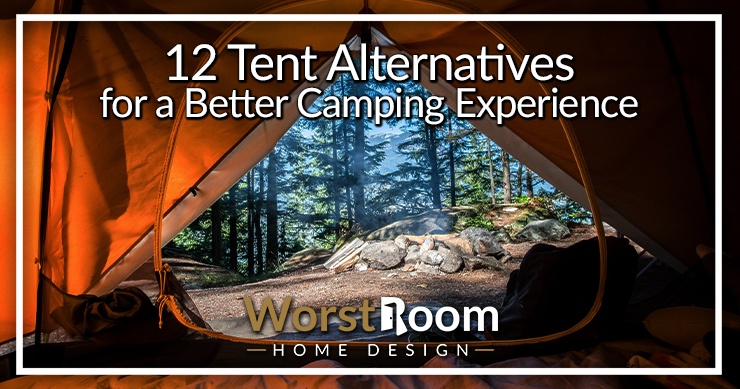
Modern campers prefer lighter tent alternatives not only for the lower weight, but many campers also prefer challenging scenarios and go for a more risky setup. It's all about getting back to nature.
Tents are the go-to shelter for camping as they shield from rain, sun, and wind in the wilderness. That said, tents are also a huge burden at times, especially when you need to trek a lot during camping.
We are here to provide you with a list of to help you with "no tent camping" to explore outdoors and enjoy nature. So, bid goodbye to your tent at home.
12 Tent Alternatives
We have curated a list of tent alternatives below to please the hiker inside you. Let's dive right in.
Hammocks
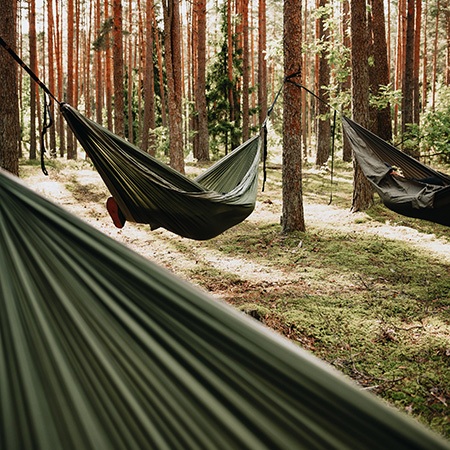
Most types of hammocks are lighter than tents, though this is not necessarily always the case depending on if you carry a metal base with you. Campers prefer tying the hammocks to trees while enjoying the outside view, though.
If you want to sleep outdoors, you need to take a net or mesh covering along to prevent mosquitoes or flies from getting inside. On cold days, you might need to carry a quilt or blankets to survive the chilly nights.
Hammocks come in different shapes and are sturdy enough to accommodate 3 people. Always check the maximum weight limit a hammock can withstand before purchasing.
Rooftop Tents
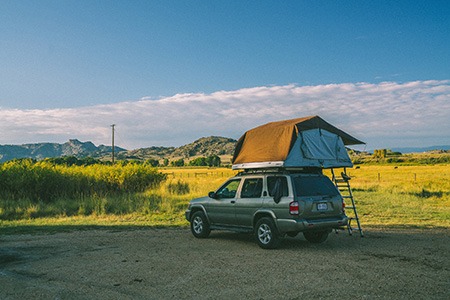
Unlike your regular tents, rooftop tents are quick and easy to install. Without needing any extra tools or effort, you can set the tent up within seconds. The pre-installed foam can be used as a sleeping pad and saves up space inside the vehicle.
You do not have to fret over critters and bugs invading the space, as you sleep off the floor. Your sleeping area is safely secured, so you can sleep peacefully.
Lastly, there is an annex, where you can hoard accessories like mattresses, quilts, and even small chairs.
Cots
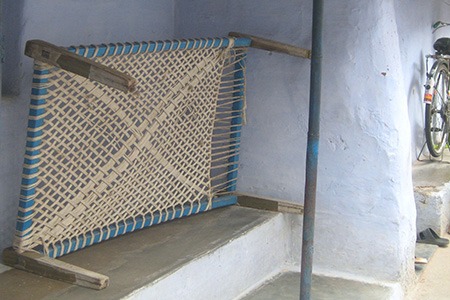
If there is no worry about storms, rain, or sun, a cot is a simple option. Cots are just like the reclined beach chairs, made of fabric bases. You will find various designs, starting from single beds to bunk ones, stationary to wheeled ones. Some have meshes to prevent any bug entry.
The cots are budget-friendly as well. To make them more comfortable, campers use blankets, camping pads, and sleeping bags with them.
Cots have to be kept on level ground to avoid any damage or risk the user’s safety. Just like with hammocks, be sure to check how much weight the cot allows.
Bivy Sacks
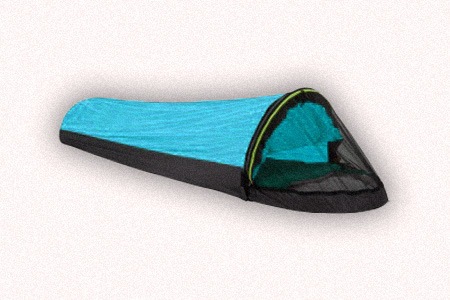
Bivy sacks are basically sacks looking like tent-like objects. If you are a claustrophobic person, you are highly advised not to try it. For caterpillars like us, who would love swooping inside the sleeping bags and zipping themselves up, these sacks are just for you.
They differ from sleeping bags because they have elevated head covers composed of mesh materials. This keeps bugs away and protects the user’s face if they sleep in it. Due to their compact and lightweight nature, hikers usually prefer this.
Bivy sacks are not usually moisture-proof, so it is better to use a tarp with them. Its insulation is, however, excellent. Thus, it makes way to this list of tent alternatives.
Tarp
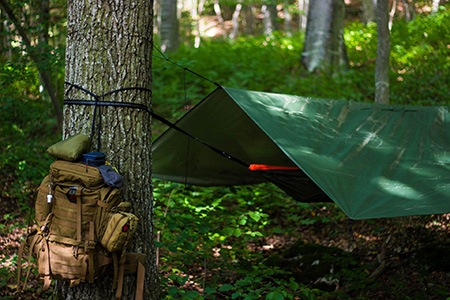
Probably, the cheapest and simplest tent alternative is the tarps. Campers who desire to make their trip more about many miles and less about coziness would love tarps. They can be used in versatile ways.
It is perfect to use a tarp when you are in a rush. But, on cold nights, tarps will send extreme chills down your spine, so you will need to resort to other means for protection.
Tarps are more waterproof and durable than the other alternatives, nonetheless. You can pair them up with cots or hammocks for added safety.
It would take two to three minutes to set up a tarp. They can be used to shade from the sun, save from wet ground, or cover from the rain. It's best to have two so you can have one below you to keep you clean from the ground and one above to block any rain, moonlight, and falling branches.
Leaf Hut
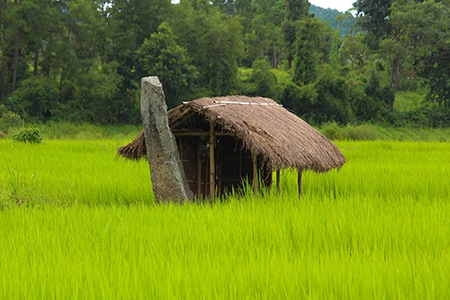
There are many campers who consider their camping to be a survival trip and demand alternatives to a tent. For the sake of adventure, they try to enjoy the natural shelter. Even more, it looks aesthetically pleasing to the eyes.
First, construct a wooden frame. Next, you shroud the frame with a thick layering of leaves.
Leaf huts are one of the most effective and simplest shelters you can make.
Pair this up with a bough bed, and prevent losing any body heat. If you do not have any sleeping pad near you, this step is essential.
Leaf huts, if built sturdily, can be waterproof. Try seeking some help when you are building it for the first time. Once you get the process down, the build itself is rewarding. This is the ultimate in "no tent camping".
Teardrop Trailers
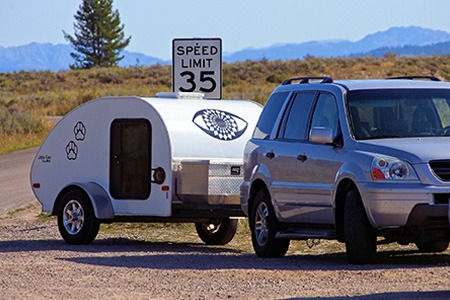
One of the most traditional shelters is the teardrop trailer. Just like the name suggests, the RV is shaped like a cute teardrop. While the front part is used as a sleeping area, the rear acts like a storage area or kitchen gallery.
Though the trailers are usually costly, the teardrop ones are budget-friendly tent alternatives. Their lightweight nature makes them easy to maneuver and towed by vehicles. Lucky for you, they can fit in garages easily.
For modern-day conveniences, teardrop trailers have battery-powered lights and electric outlets. You will get the feel of home even while you are outdoors.
You can upgrade from a teardrop trailer to a tent trailer, and on to a motorhome, an RV trailer, an airstream, and a full on camper van if you enjoy the experience. It becomes a lot less like camping, though, and more like having a home on wheels, as opposed to a stationary one like a cabin.
Trench Shelters
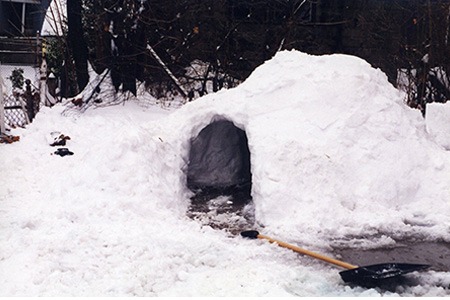
What if you are camping in the middle of a far snowland? In such scenarios, trench shelters are your go-to option.
Trench shelters are made from two walls of snow. As for the top, it can be covered using a rain fly or natural materials. If you have any types of shovels with you and a tarp, you can dig down some in the middle and lay the tarp down so you don't get wet.
When you make the trench shelter, leave as much room as possible inside it. The shelter should be designed in a way to trap body heat in the freezing weather. Trench shelters protect from the rain and the wind and are easier to build.
Combine it with some sort of insulation to not lose any body heat to the ground. Some wise campers cover the wall with insulating materials as well. One of the most commonly used insulating items is spruce green.
Yurt

Next up on the list is yurt camping. They have formed an integral part of modern-day glamorous camping or glamping.
Yurts are miraculously warm and spacious with a crowned roof and round design. Yurts promise to give you an unforgettable experience. However, you might need to make reservations beforehand.
As for the structure, yurts are dome-shaped. They can accommodate luxurious furniture like chairs, tables, queen-size beds, and others. Some yurts are even two-storied.
If you have pets, yurts bring you good news as tent alternatives. They are pet-friendly, unlike others on this list. Brace yourself to enjoy nature alongside your little fur friend.
Sleeping Bags
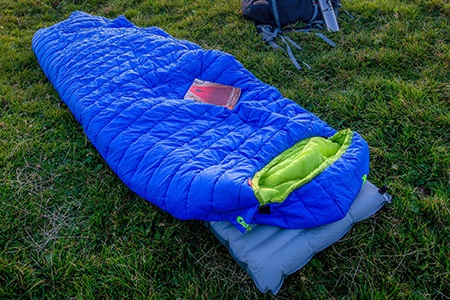
Suppose your perfect camp plan gets disrupted due to high wind and a tent won't stay up. You must have alternatives for such scenarios. Sleeping bags enter the scene to have your back.
You can even toss a sleeping bag or two in the back of a pickup truck to stay off the ground, and bonus points if it has a canopy on the truck bed. Talk about alternatives to a tent... this is the luxury life right here.
Sleeping bags are a lot more budget-friendly than other alternatives. All you need to do is roll out the bag. Pair it up with substitutes like camping blankets or pads to make it more comfortable. If you have enough space, try to fit in an air mattress as well.
Make sure there are no hard objects like screws lying underneath. Sleeping bags have different types. Ensure you use the one that suits the season. Well-insulated ones might be appropriate for winter, while the breathable ones are fit for summer. You can also seek out sleeping bag alternatives you may enjoy more.
Portable Awning
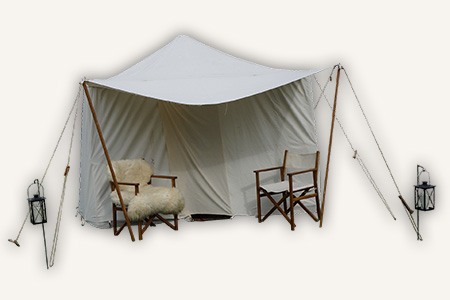
A quick fix to sudden expeditions at campsites or beaches is a portable awning. It can be easily attached to your vehicle. Portable awnings can offer protection and shade from all the elements in nature.
Campers love these types of awnings for their multi-purpose activities. No hassle is involved with its installation process. When not in use, the flexible awning can be stored quite easily. Not only this, the portable awning can protect any outdoor furniture from rain, snow, or sun.
Shelterless
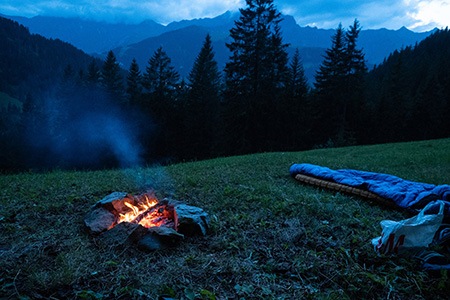
Yes, even this can be a tent alternative. Some hikers deem shelters to be extremely unnecessary. They prefer sleeping under the stars, enjoying the beautiful view. Backpacker Magazine calls this "Cowboy Camping".
Ensure that you have checked the weather forecast. If you are uncertain about the chances of any downpour, we suggest that you carry a lightweight tarp (preferably, a cheap tarp), and a means to create a shelter so you aren't drenched all night.
It is recommended that you carry sleeping bags for emergencies, though, not just "no tent camping". As cool as shelterless sounds, it exposes you to many risks in the wilderness. Therefore, it is better to prepare yourself for the worst.
Tent Alternatives So We Can All Go Camping
If you want lightweight alternatives to a tent, go for tarps or bivy sacks. For anyone who wants to be close to nature, trench shelters, portable awnings, and shelterless shelters would be good. And if you would love to enjoy the comfort of home, give the teardrop trailers a try.
Now that you have gone through our tent alternatives, you should start preparing for your camping journey. You can go with your friends even if you don't have a tent!



